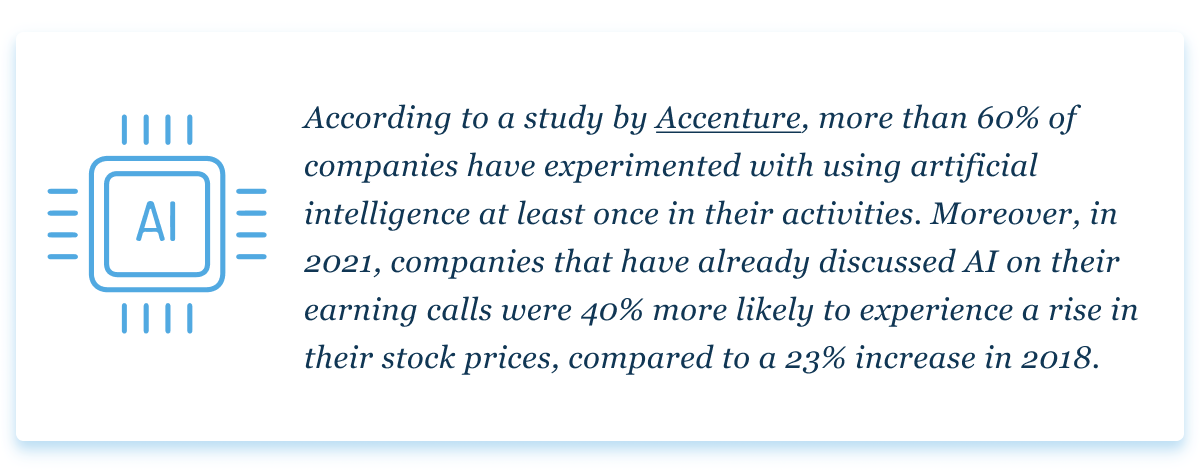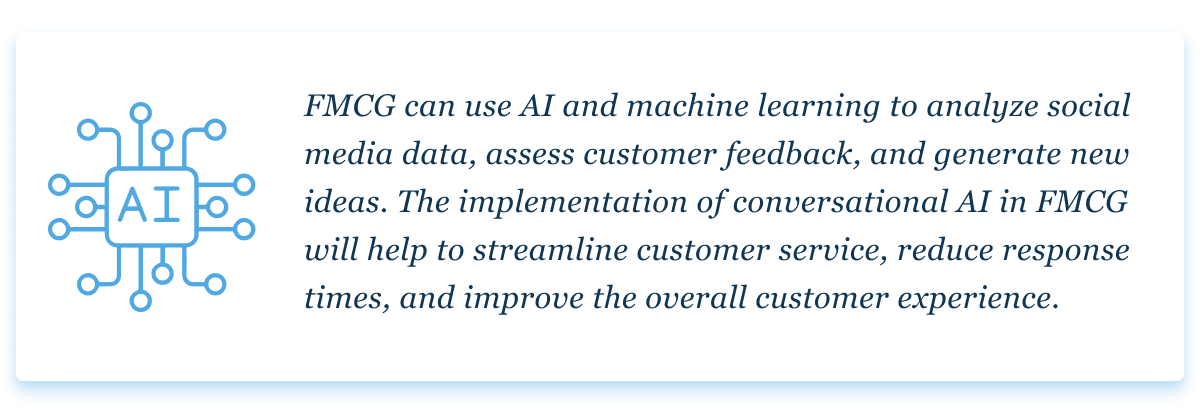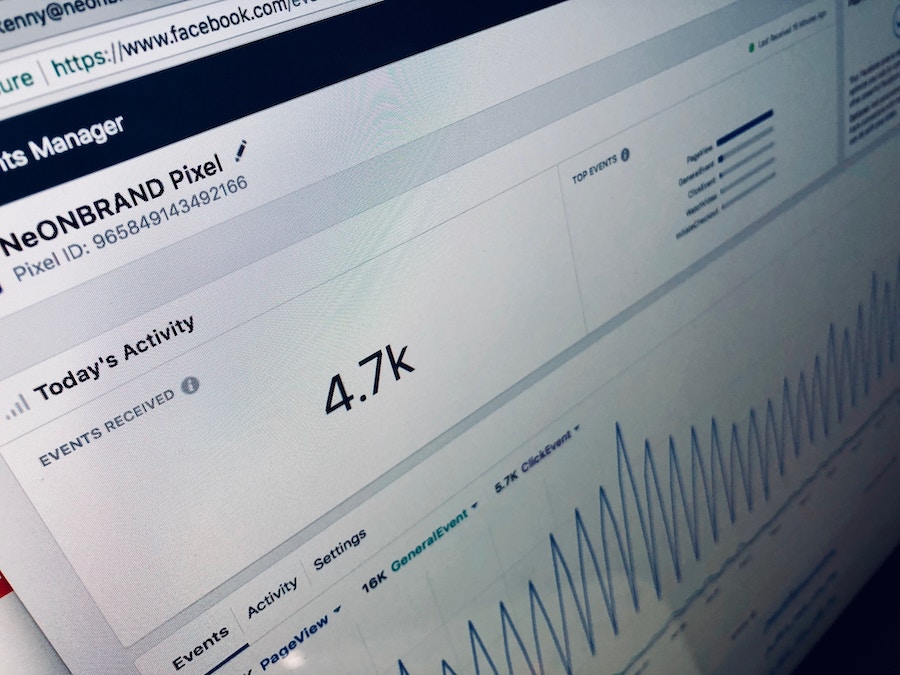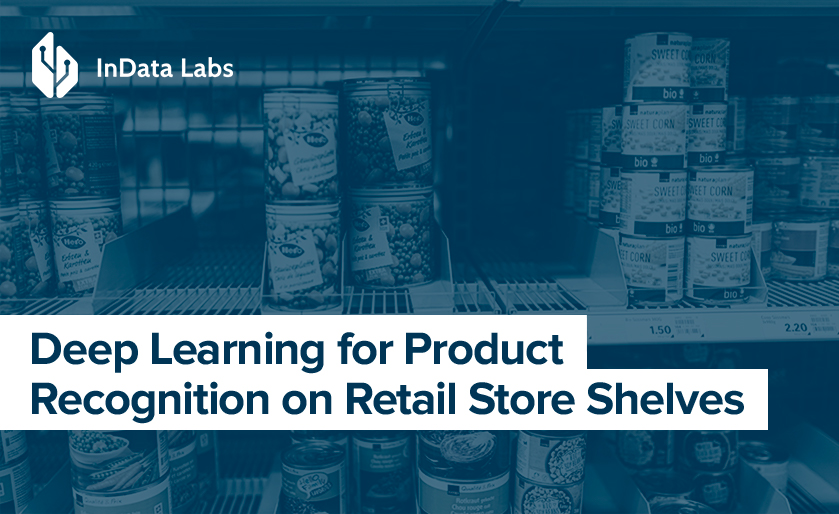Every day Fast-Moving Consumer Goods (FMCG) companies are facing a range of challenges, such as increased competition, changing consumer preferences, and the growing need to adopt new technologies. However, with the adoption of AI, FMCG businesses can now gain real-time insights into market trends, minimize expenses, and optimize their business processes..
Therefore, some companies are now seeking resources to explore AI, while others refer to FMCG AI consulting experts to help them implement the technology effectively. Meanwhile, supply chain, marketing, and customer experience consulting providers are also shifting their focus toward incorporating this new technology into their FMCG clients’ strategies.

In this article, we will highlight the use of AI in FMCG and how this technology impacts different spheres of retail companies. Keep reading to discover how you can increase sales, improve customer experience, and optimize logistics with AI in FMCG.
The impact of technology on the FMCG industry
If you considering the integration of AI in FMCG, please take a look at the top use cases to gain actionable insights on the use.
Cloud computing
Cloud computing in FMCG means the delivery of cloud services to improve business operations, such as data analysis, customer engagement, and more. FMCG companies are using cloud computing primarily through the adoption of cloud-based supply chain management systems. Such solutions allow companies to effectively manage their inventory, logistics, and distribution channels.
Moreover, cloud services enable FMCG companies to easily scale their computing resources up or down, providing flexibility during peak seasons or in response to market changes.

Source: Unsplash
Internet of Things (IoT)
IoT in the FMCG industry uses interconnected devices to improve various aspects of FMCG operations. With IoT devices, FMCG companies can automate inventory monitoring, collect behavioral data, and track products throughout the supply chain. As a result, the implementation of the Internet of Things can reduce expenses and enhance operational effectiveness.
It is crucial to note that IoT technologies are vulnerable to cyber threats due to their increased connectivity and data collection capabilities. The Internet of Things has the potential to gather sensitive data, possibly leading to a loss of trust by the client and also compromising data protection.

Source: Unsplash
Big data
Big Data refers to the vast amount of both structured and unstructured data. Using Big data and AI in FMCG, companies can receive insights into consumer behavior and preferences.
Establishing a sound data architecture is a crucial aspect of data clustering and analysis. It is also a requirement for addressing privacy, security, and cost issues. Moreover, poor security of a data warehouse may lead to data leaks and privacy breaches.
AR and VR

However, not all FMCG companies have the resources to hire skilled professionals to operate and maintain AR and VR technologies. That’s where IT staff augmentation companies come in. With this service, FMCG companies can get access to highly experienced AR and VR experts on a temporary or contract basis.
This allows FMCG companies to scale their IT resources up or down as needed, without incurring the overhead costs associated with hiring a full-time team. The best use-case of AR and VR in marketing for FMCG is creating virtual product experiences. This allows customers to interact with the products in a simulated environment. In addition, it can provide valuable information on customer preferences and behavior, which helps with product development and marketing strategies.
AI and Machine Learning
Machine Learning and Artificial Intelligence in FMCG/CPG refer to the use of algorithms and data analysis to understand consumer behavior and improve supply chain management. Here are the advantages of implementing AI in FMCG industry:
- Personalized marketing campaigns and product recommendations based on consumer preferences;
- Enhanced customer experience using chatbots and virtual assistants;
- Analytics for forecasting demand, changing pricing, and facilitating product development.
However, the disadvantages may include data privacy issues and the high cost of implementing machine learning and artificial intelligence technologies in FMCG industry.

Use cases of Artificial Intelligence that FMCG companies can incorporate
Take a closer look at some common artificial intelligence use cases in 2023.
Sales improvement
FMCG Artificial intelligence technologies can significantly improve sales performance in various industries such as healthcare, finance, retail, education, and more.
Let’s check how AI in FMCG companies brings in more revenue:
- Sales forecasts. By analyzing historical sales data and market trends, AI can predict future sales patterns. This enables companies to target the right customers with the right products.
- Churn prediction. AI tools can help to analyze the level of engagement, purchase history, consumer sentiment, etc. Based on this knowledge, companies can predict if their buyers are about to abandon the brand. Moreover, AI technologies give recommendations on how to retain them by offering better solutions that match their needs.
- Automation of sales-related operations. Artificial intelligence in FMCG helps with the optimization of sales processes by answering questions regarding the product or service, pricing, and shipment. With such computerization, businesses reduce costs, thus sustaining profitability.
- Analysis of consumer behavior. Knowing the clients’ preferences based on their previous experience, it is easy for companies to demonstrate an individual approach. Personalized offers always lead to an increase in the customer’s desire to purchase the relevant products.

Source: Unsplash
Overall, AI in FMCG companies can create unique customer experience, forecast sales patterns, automate inventory management, and predict risks of losing customers. Therefore, by implementing AI in FMCG industry, companies can gain a competitive edge and drive business growth.
Customer experience
With AI in the FMCG sector, companies may better understand their consumers’ needs. How can artificial intelligence in the FMCG industry impact the client experience?
- Recommendation systems. Artificial intelligence in FMCG can analyze the clients’ purchase history and develop recommendations based on their exact needs.
- Sentiment analysis. AI can leverage customer care analytics to monitor reviews and comments about the brand on social media. Companies can then use this information to improve product or service quality and enhance customer satisfaction.
- Customer retention. AI for FMCG predicts the possible risks of losing a client and then eliminates the causes for this. Innovative technologies may help analyze the visitor’s activity on the website or application. By tracking the most frequently visited pages and the average time spent, companies can analyze their clients’ preferences and behavior. Hence, businesses can offer personalized products or engage purchasers in a loyalty program in order to retain them.
- Client’s journey analytics. AI analyzes buyers’ interactions with the brand during the whole cycle. Therefore, it can identify pain points and areas for improvement.
- Customer engagement. Chatbots powered by Natural Language Processing (NLP) interact with web visitors, providing assistance and support in real time. With AI chatbots, companies can maintain 24/7 accessibility for clients and free up the support agents’ time.
So, the implementation of AI in FMCG sector can lead to enhanced customer experiences, better sales performance, and higher customer retention rates.
Marketing analytics
Artificial intelligence has a notable impact on marketing analytics in the FMCG industry. AI can help to analyze vast amounts of data that leads to getting actionable insights into customer behavior and preferences. As a result, it allows companies to make informed decisions and improve their marketing strategies.

Source: Unsplash
How exactly can AI in FMCG facilitate marketing analytics?
- Improved market trends tracking. AI can take data from social media, online searches, and purchasing history to identify changes in consumer preferences. This information helps FMCG companies proactively respond to market changes and better meet the evolving needs of their clients.
- Customer targeting. AI algorithms can analyze large amounts of data to create predictive models that identify buying behavior patterns. AI can help companies determine the specific audience that matches the ideal client profile.
- Personalized advertising. By analyzing consumer behavior and their previous experiences, AI can understand what they did and didn’t like. Creating targeted ads for relevant people will increase their interest in the product.
- Behavior-based audience segmentation. Businesses can use AI to analyze the leads’ behavior to understand who will most likely be interested in a particular product and create campaigns targeting those customers specifically.
AI in FMCG leads to more accurate predictions of user behavior, ultimately helping companies to improve their ROMI.
Supply chain and inventory management
AI-driven market solutions have impacted various aspects of business, from supply planning to out-of-stock management:
- Supply planning. AI-powered algorithms can analyze sales trends, inventory levels, production capacity, and other factors, to develop the supply chain strategy correctly.
- Improved demand forecasting. With data about sales history and market trends, AI in FMCG provides accurate demand forecasts. Projected demand levels help determine the production rate and avoid overstocking.
- Enhanced productivity. AI automates routine tasks, such as inventory tracking and order processing. Thus, businesses can free up human resources and focus on more strategic activities.
- Lower supply chain costs. The implementation of AI in FMCG industries enables the optimization of logistics and transportation routes. It leads to a reduction in inventory carrying costs and an improvement in supplier management.
- On-time delivery. AI analyzes traffic patterns, weather conditions, and shipping delays, ensuring the products will be delivered in a timely manner.
- Predictive maintenance. Detecting potential failures before they occur can reduce maintenance costs.
- Out-of-stock management. AI identifies when few products are left and when there is a need to replenish them. The inventory levels remain optimized with AI in FMCG.
AI use cases in FMCG have proven that businesses can improve their operations and meet customer demands more efficiently, leading to facilitated inventory management and revenue growth.
Security and safety
With the ability to control warehouses, supervise employees, detect intruders, and identify vehicles, AI in FMCG can provide a high level of protection for companies and their customers.
Here are some cases where AI shows great results in improving FMCG:
- Controlling the warehouses and supervising the employees. Cameras with AI-installed technologies can monitor warehouses to ensure that no unauthorized individuals enter the premises. AI can also recognize changes in employee behavior, such as unusual movements or unsafe actions, to predict accidents or theft.
- Monitoring of the marketplace. The companies may get notifications when goods are sold without their permission.
- Identifying vehicles. AI identifies automobiles entering and leaving the warehouse or other facility areas. This AI technology can help track inventory and ensure that only authorized persons have access to these zones.
- Face recognition. Through AI-powered tools, companies track the attendance and location of their employees to ensure that they are present for their shifts and working in the correct workplaces. There are several AI image recognition software providers, including Amazon Rekognition, Google Cloud Vision API, and IBM Watson Visual Recognition.

Product placement
With AI, retailers can improve their merchandising efforts and drive sales growth.
Explore the impact of Artificial intelligence on product placement:
- Optimization of store layouts. FMCG businesses use AI to analyze in-store consumer behavior and understand the best places to sell certain products. With this knowledge, companies may use strategic placement of products to boost sales and enhance customer engagement.
- Avoiding stock shortages and overstocking. Artificial intelligence in FMCG analyzes sales trends, inventory levels and other data. Based on this information, AI tools recommend the best time to order new products or restock existing ones.
AI has revolutionized product placement in the FMCG industry by improving store layouts and inventory management. By optimizing retail merchandising, companies may make more sales and meet customers’ needs faster.
Examples of FMCG companies using AI
Sephora’s Color IQ technology is an excellent illustration of AI use cases in FMCG that increased sales by 34%. Using AI in FMCG, Sephora provides personalized recommendations to customers. For instance, the technology matches clients with the perfect shade of foundation based on their skin tone.
As an example of improved customer experience, it’s worth mentioning AI-powered digital kiosks by McDonald’s. They allow customers to place orders and customize their meals, reducing wait times and increasing customer satisfaction and loyalty. In addition, the menus are able to recommend menu items that are currently trending or popular during specific times of the day and particular weather conditions.

Source: Unsplash
As for marketing analytics, Coca-Cola is one of the FMCG companies using AI to analyze customer data and improve its marketing campaigns. AI-generated insights into consumer preferences and interests enable Coca-Cola to target its audience more effectively.
Walmart integrated AI-powered robots in its warehouses to optimize inventory management and minimize expenses. These robots can scan shelves, monitor inventory levels, and restock items automatically. By automating routine tasks, Walmart boosted its productivity and efficiency, resulting in significant cost savings.
Using AI-powered cameras in its warehouses, Amazon monitors the movement of products and ensures that they are being placed in the correct locations. The cameras also help to track the workers location and movement and identify any potential safety hazards.
P&G used AI-powered tools to optimize product placement in stores. These tools analyze customer behavior and store layout to determine the most effective product placement. P&G achieved boosted sales and revenue by improving product visibility and accessibility.

Source: Unsplash
Conclusion
To sum up, AI in FMCG is rapidly evolving, improving many processes and bringing endless benefits to businesses. AI can assist in an increase in sales by forecasting customers’ needs and market trends, predicting clients’ churn, offering ways to retain them, and automating sales-related activities. With AI in FMCG, your business analysts can understand customers’ needs better and come up with a personalized approach.
Identifying the target audience can result in providing the appropriate products to the intended customers. AI also improves supply chain management by optimizing supply planning and enhancing demand forecasting. Furthermore, AI can improve security and safety in the industry by detecting intruders and unauthorized sales of products.
It is clear that Artificial intelligence has already begun to revolutionize the FMCG industry, and this trend is only set to continue. As AI technology continues to evolve and become more accessible, we can expect to see more applications of AI in FMCG. They will mostly be related to product personalization and boosting productivity. For companies that want to stay ahead of the curve and remain competitive, embracing AI is no longer an option – it is a necessity.
Adopt AI to power up your FMCG business
Looking to implement AI in your FMCG business? InData Labs offers expertise in AI-powered solutions for supply chain optimization, inventory management, product placement, and more. Contact us to start using AI to transform your FMCG business today and achieve better customer satisfaction and revenue growth.



